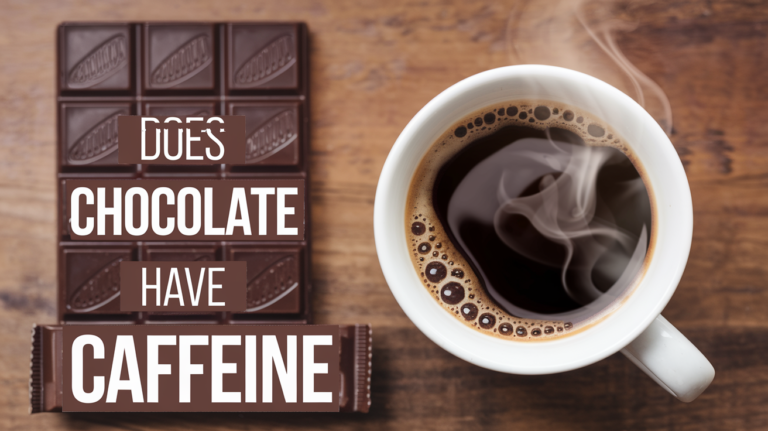Does Chocolate Have Caffeine?: Chocolate is beloved by many—whether it’s a silky piece of milk chocolate, the bold richness of dark chocolate, or the smooth buttery texture of white chocolate. But how much do we really know about what’s in this indulgent treat? One question that often sparks curiosity is, “Does chocolate have caffeine?” This blog dives deep into the science, impact, and myths surrounding chocolate and its caffeine content, so you can savor your next chocolate bar with newfound knowledge.
Does Chocolate Have Caffeine? An Overview
Understanding the Relationship Between Chocolate and
Caffeine
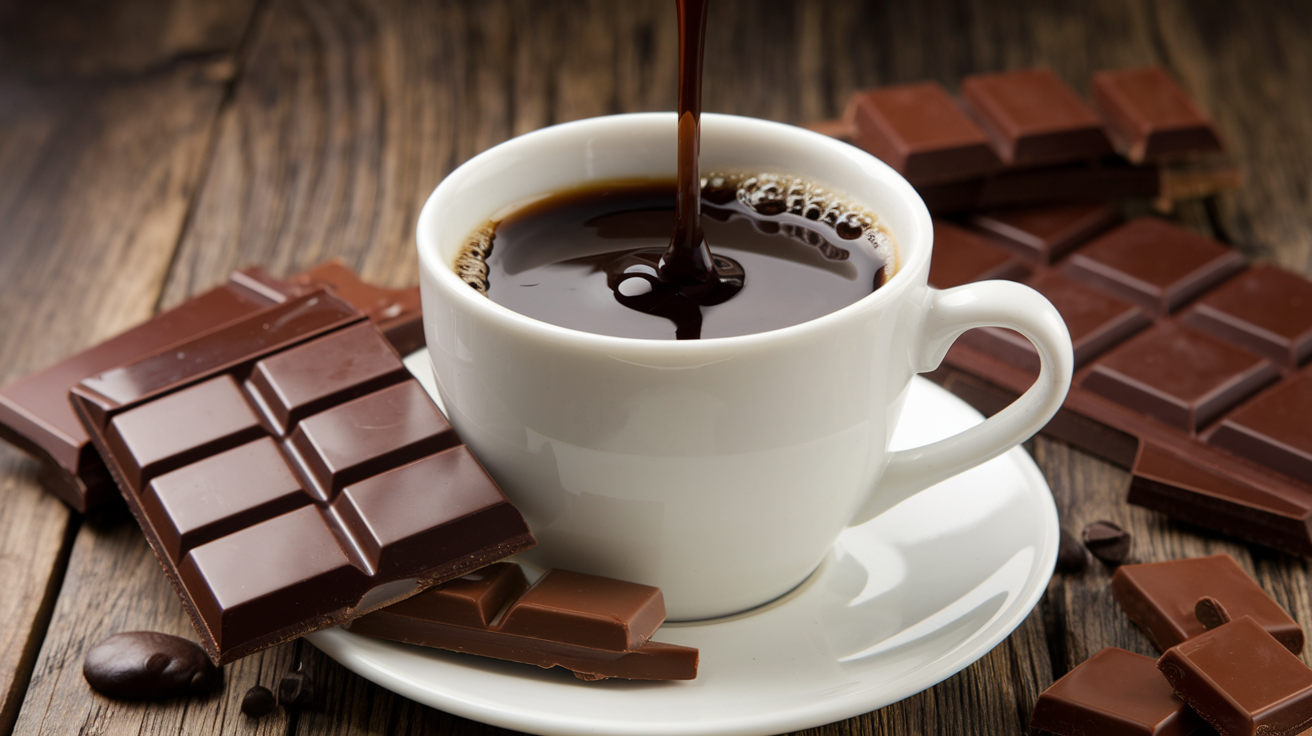
Yes, chocolate does have caffeine. However, the caffeine content in chocolate varies depending on the type of chocolate and how it’s processed. Dark chocolate, for example, typically contains more caffeine than milk chocolate due to its higher cocoa content, while white chocolate has little to no caffeine since it’s made primarily from cocoa butter. Chocolate lovers might be surprised to know that the relationship between chocolate and caffeine goes all the way back to its source—the cocoa bean, which is naturally caffeinated.
How Caffeine Ends Up in Your Favorite Chocolate Treats
Caffeine is naturally found in cocoa beans, the key ingredient in chocolate. These beans are harvested, fermented, dried, roasted, and finally processed to create the chocolate we enjoy. During this process, the caffeine content from the cocoa beans is carried over into the final product.
The levels of caffeine in your favorite chocolate treat will depend on the cocoa percentage—the higher the cocoa content, the more caffeine it contains. For instance, a bar of dark chocolate can contain as much as 20-60 milligrams of caffeine per ounce, while milk chocolate contains significantly less, usually around 5-10 milligrams per ounce. The specific methods used in the chocolate-making process can also influence how much caffeine ends up in the finished product, making each type of chocolate unique.
Does Chocolate Have Caffeine? The Science Behind It
Exploring Cocoa Beans and Their Natural Caffeine Content
Cocoa beans, the seeds of the cacao tree, are the foundation of all chocolate. These little beans naturally contain caffeine, a well-known stimulant, as well as theobromine, a compound that also acts as a milder stimulant. Together, caffeine and theobromine contribute to chocolate’s signature energy-boosting effects, though theobromine is typically present in much larger quantities. Theobromine, while less potent than caffeine, provides a longer-lasting and more subtle boost in energy, making it a unique component of chocolate’s appeal. This combination of stimulants explains why chocolate is often enjoyed as a treat to help improve focus and mood.
The Process of Turning Cocoa Into Chocolate
The journey of cocoa beans from plant to chocolate bar involves a series of steps, each of which can influence their caffeine content. After being harvested, the beans are fermented to develop their flavor, roasted to create the rich chocolate taste we love, and then processed into cocoa powder, cocoa butter, or chocolate.
The caffeine content of chocolate depends largely on these processing methods and the final composition of the product. For instance, dark chocolate, which contains a higher percentage of cocoa solids, naturally has more caffeine than milk or white chocolate.
On the other hand, cocoa products with lower cocoa percentages are often diluted with sugar, milk, or other ingredients, reducing their caffeine levels. The final product not only varies in caffeine content but also in flavor and texture, catering to a wide range of preferences.
Does Chocolate Have Caffeine? Breaking It Down by Type
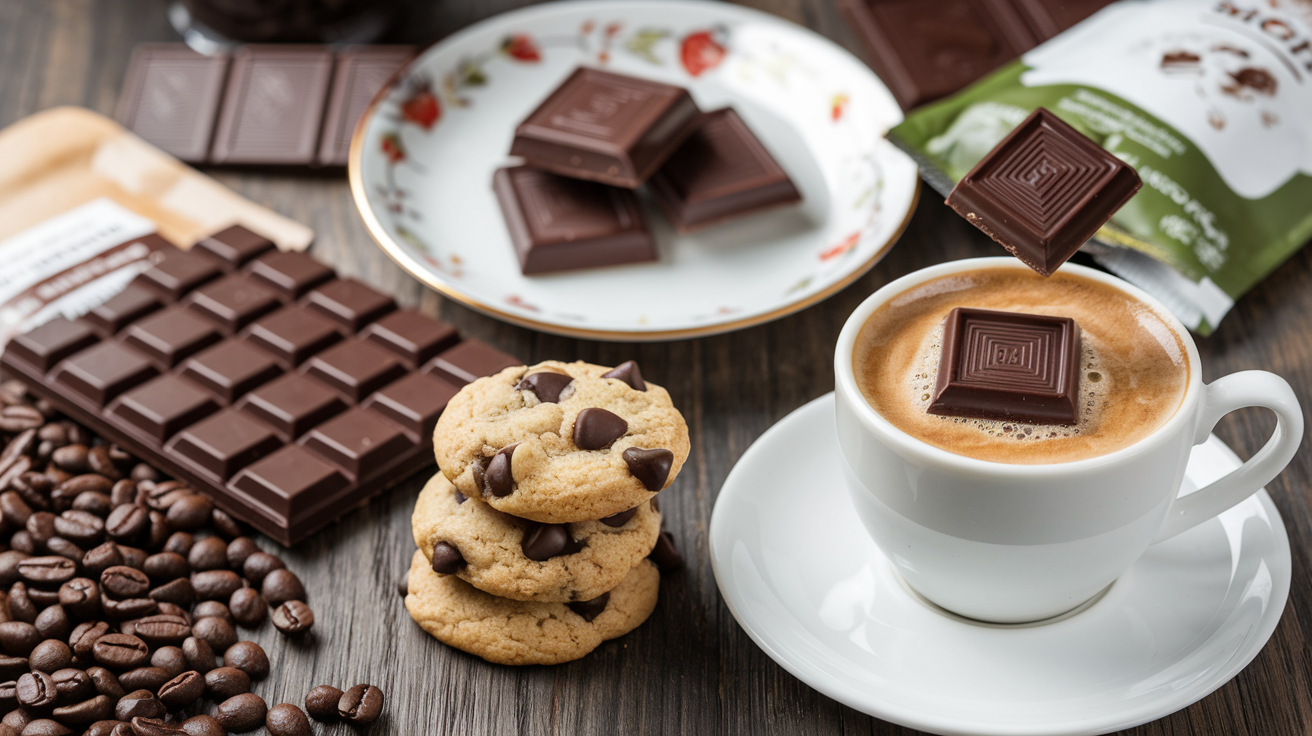
Caffeine Levels in Dark Chocolate vs. Milk Chocolate
Dark chocolate is a haven for strong, rich flavors—and for caffeine. The higher the cocoa content, the higher the caffeine levels. Dark chocolate typically contains anywhere from 12 to 20 milligrams of caffeine per ounce, but this amount can vary depending on the percentage of cocoa solids in the chocolate. For example, a dark chocolate bar with 85% cocoa will have significantly more caffeine than one with 50%. This makes dark chocolate a popular choice for those looking for a more intense flavor profile and a slight energy boost.
On the other hand, milk chocolate has a much lower cocoa percentage, as it includes milk solids and sugar to create its creamy, sweet flavor. This dilution reduces its caffeine content, which averages around 5 to 10 milligrams of caffeine per ounce. While it’s not as much of a stimulant as dark chocolate, the lower caffeine levels make milk chocolate a more approachable option for those sensitive to caffeine.
Why White Chocolate Contains Little to No Caffeine

White chocolate is often seen as the outlier in the chocolate family. Why? Unlike milk or dark chocolate, white chocolate doesn’t contain cocoa solids. It’s made from cocoa butter, sugar, and milk, but it skips the cocoa solids entirely. Since caffeine resides in the cocoa solids, white chocolate has virtually no caffeine. This makes it an excellent choice for individuals who are sensitive to caffeine but still want to enjoy a creamy, chocolate-like treat.
Additionally, because it lacks cocoa solids, white chocolate has a much milder flavor profile, often described as sweet and buttery rather than rich and robust like dark chocolate. While it may not satisfy traditional chocolate purists, it’s a popular option for desserts and treats that require a softer, lighter chocolate element.
Does Chocolate Have Caffeine? The Health Impact
How Caffeine in Chocolate Affects Your Energy Levels
Chocolate contains a small amount of caffeine, but its effects are enhanced by the presence of theobromine, a compound with similar stimulating properties. Together, they provide a gentle energy boost that feels smoother and more gradual compared to the quick, sharp jolt delivered by coffee or energy drinks. This makes chocolate an appealing option for those looking for a milder pick-me-up during the day. The combination of caffeine and theobromine also promotes improved focus and alertness, making chocolate an enjoyable way to combat midday sluggishness.
Can Chocolate’s Caffeine Cause Sleep Issues?
Although the caffeine levels in chocolate are relatively low, consuming large quantities—particularly dark chocolate, which contains higher amounts—can potentially lead to sleep disturbances, especially when eaten in the evening. For sensitive individuals, even small amounts of caffeine can affect the ability to fall or stay asleep. Theobromine, while milder than caffeine, may also contribute to restlessness if consumed too close to bedtime. To avoid these issues, it’s a good idea to enjoy chocolate earlier in the day or in moderation during the evening. If you’re particularly sensitive to caffeine, milk chocolate or white chocolate might be better options, as they typically contain lower levels of stimulants.
Does Chocolate Have Caffeine? Daily Consumption Insights
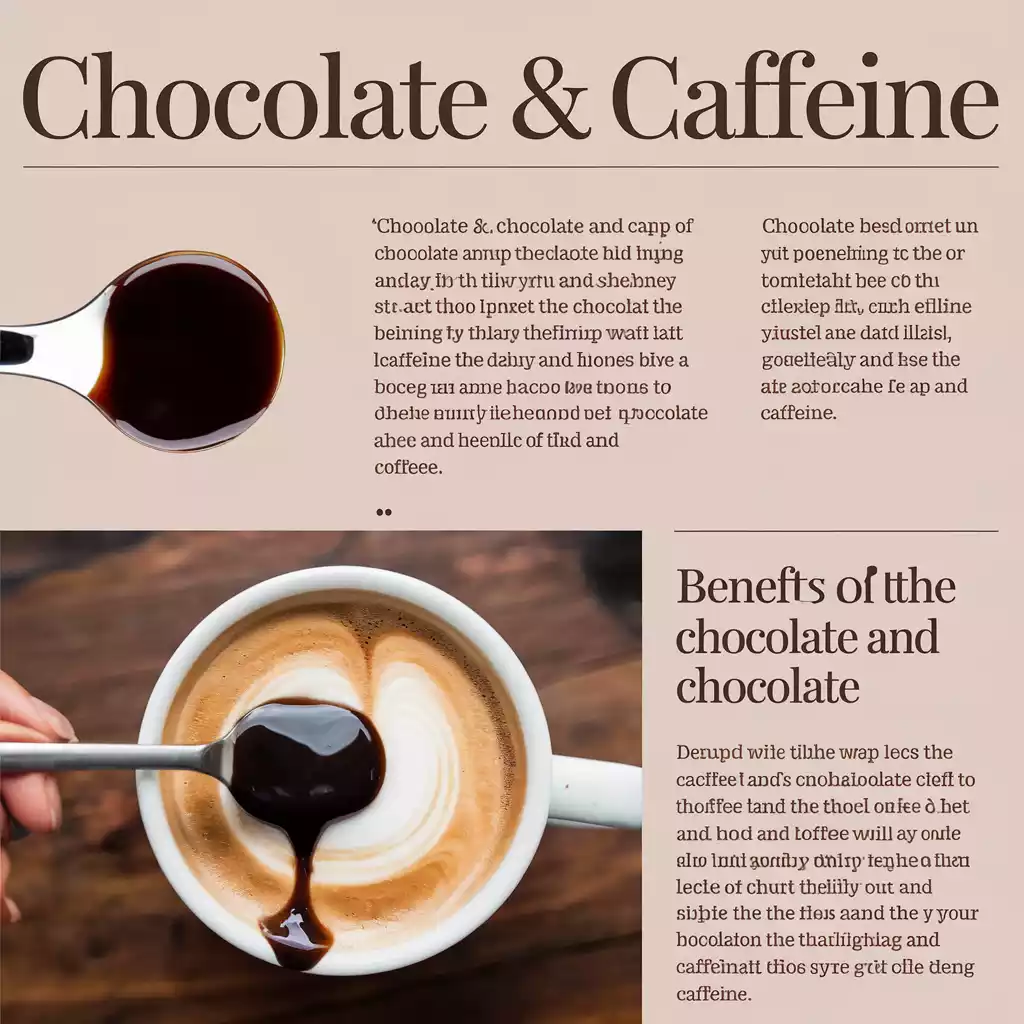
How Much Chocolate Is Safe to Eat Without Overloading on Caffeine
For most people, consuming chocolate in moderation—about one to two ounces per day—poses no caffeine-related risks. However, pairing chocolate with other sources of caffeine, like coffee, can quickly add up.
The Role of Chocolate in a Balanced Diet
Chocolate, when enjoyed in moderation, can fit into a balanced diet. Its antioxidants and mood-enhancing properties make it a sweet treat worth savoring—but balance is key.
Does Chocolate Have Caffeine? Comparing to Other Foods
Chocolate vs. Coffee: Which Has More Caffeine?
Coffee is the clear winner here. A medium-sized cup of coffee contains about 95 milligrams of caffeine on average, while a typical serving of dark chocolate has only about 20 milligrams.
How Chocolate Stacks Up Against Tea and Energy Drinks
Chocolate has less caffeine than tea (30–70 milligrams per cup, depending on the type) and far less than energy drinks, which often exceed 150 milligrams per serving.
Does Chocolate Have Caffeine? Myths vs. Facts
Debunking Common Misconceptions About Chocolate and Caffeine
One common myth is that all chocolate contains large amounts of caffeine. While it’s true that dark chocolate can have a decent dose, milk chocolate’s caffeine levels are minimal, and white chocolate is virtually caffeine-free.
Why Some People Think Chocolate Is Caffeine-Free
The confusion often stems from the fact that chocolate’s stimulating effects are often mistakenly attributed to caffeine alone, when it’s the combination of caffeine and theobromine that delivers chocolate’s unique buzz.
Does Chocolate Have Caffeine? For Kids and Teens

Should Children Worry About Caffeine in Chocolate?
Chocolate is generally safe for children, given its low caffeine content. However, it’s a good idea to monitor portions, especially in kids sensitive to stimulants.
Safe Chocolate Choices for Younger Age Groups
Milk chocolate and white chocolate are safer options for kids due to their negligible caffeine levels. Avoid excessive consumption of dark chocolate for younger age groups.
Does Chocolate Have Caffeine? Tips for Smart Consumption
Best Times to Enjoy Chocolate Without Disrupting Sleep
To avoid sleep disturbances, enjoy chocolate earlier in the day. Pairing it with meals or as an afternoon treat can help prevent any late-night jitters.
Choosing Chocolate Based on Your Caffeine Sensitivity
If you’re sensitive to caffeine, opt for milk or white chocolate to satisfy your cravings without overstimulation.
Does Chocolate Have Caffeine? Hidden Sources to Watch
Surprising Foods and Drinks That Contain Chocolate and Caffeine
Desserts like chocolate cakes, brownies, and even ice creams may contribute to your daily caffeine intake. Keeping portion sizes in mind can help you stay within safe limits.
How Chocolate in Desserts Adds to Your Caffeine Intake
Be cautious of desserts that combine chocolate with coffee or espresso, as the caffeine content can multiply quickly.
Does Chocolate Have Caffeine? Fun Facts to Know
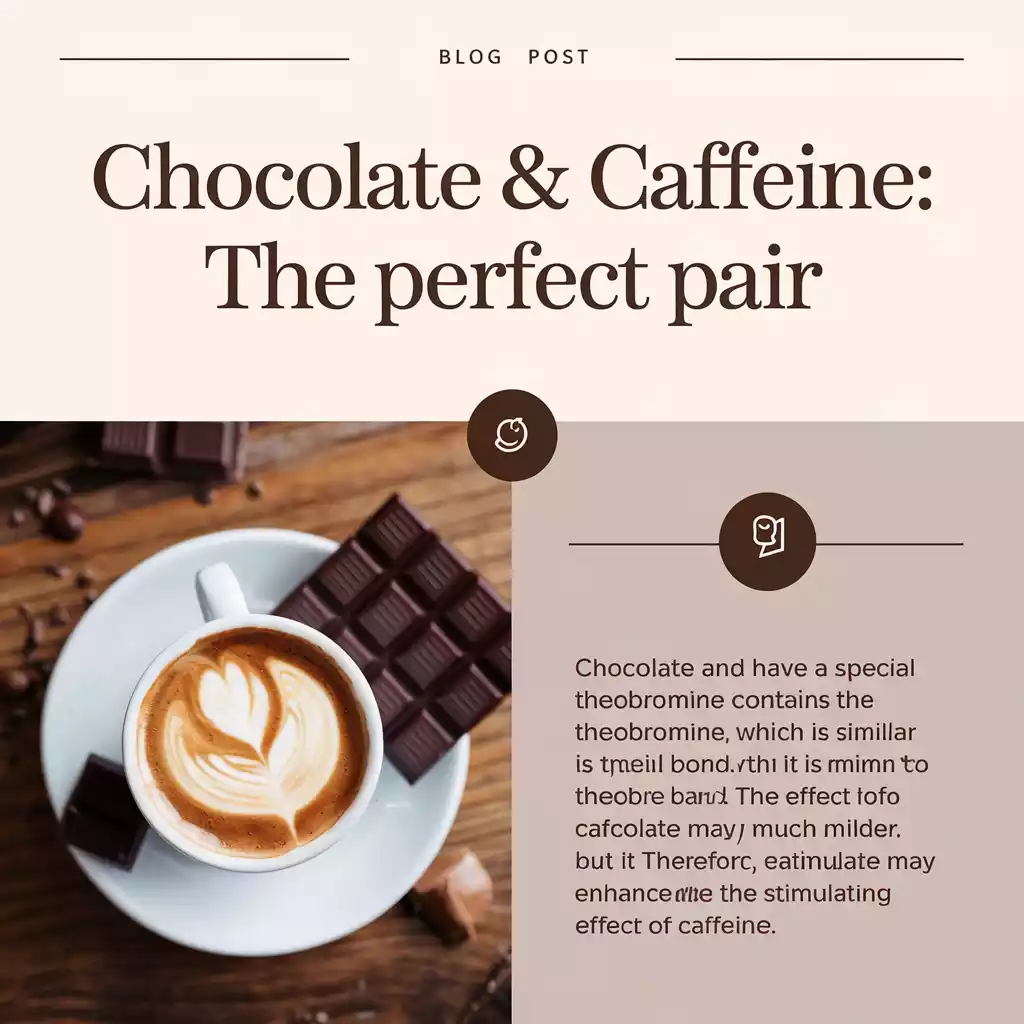
The Surprising History of Chocolate and Caffeine
Centuries ago, ancient civilizations like the Mayans and Aztecs consumed cocoa beans as a ceremonial drink—appreciated for its energy-boosting properties even back then.
How Caffeine Enhances the Flavor of Chocolate
Caffeine not only provides stimulation but also enhances chocolate’s characteristic bitter-sweet flavor profile.
The Final Verdict on Chocolate and Caffeine
Yes, chocolate does have caffeine, though the amount varies widely by type. Understanding the caffeine levels in chocolate can help you make informed choices that suit your lifestyle. Whether you love the bold richness of dark chocolate or prefer the subtle sweetness of milk or white chocolate, moderation is the key to savoring it.
Looking to enjoy chocolate without the jitters? Explore caffeine-free chocolate alternatives or balance your intake based on your sensitivity. After all, chocolate isn’t just a treat—it’s an experience.
pinterest: Does Chocolate Have Caffeine?
Post Disclaimer
The information contained in this post is for general information purposes only. The information is provided by Feast Forge Chef and while we endeavour to keep the information up to date and correct, we make no representations or warranties of any kind, express or implied, about the completeness, accuracy, reliability, suitability or availability with respect to the website or the information, products, services, or related graphics contained on the post for any purpose.

